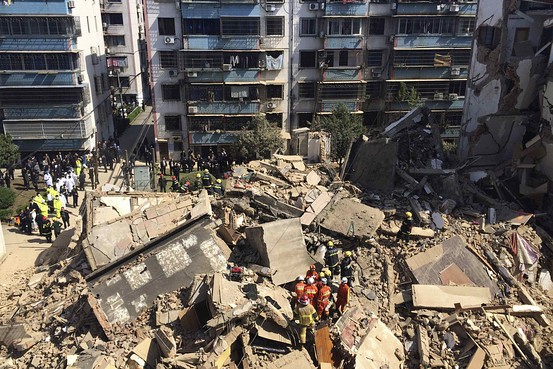Home -> News -> Media -> The Real China Housing Collapse: ‘Vintage’ Buildings
The Real China Housing Collapse: ‘Vintage’ Buildings

They don’t build ‘em like they used to, and when it comes to housing in China, that’s probably a good thing.
According to the official Xinhua news agency, the price behind the breakneck pace of China’s construction boom since the reform and opening is becoming clear, with buildings collapses frequently involving those constructed in the 1980s and ‘90s.
That was evident last week, when a five-story residential building constructed in 1994 collapsed in Fenghua in coastal Zhejiang province, killing one person and burying several others in the rubble.
Only an eyebrow-raising 22% of China’s housing stock was built before 2000. But its recent vintage doesn’t necessarily mean it’ll last very long: According to an unnamed government official Xinhua cited this week, China’s buildings are generally expected to last for just 25 to 30 years. The reason is poor quality of construction and design, Xinhua said, adding that many seismically unsafe buildings from the ‘80s and ‘90s in the country still exist.
As of Tuesday afternoon, some 1.6 million comments were posted on Weibo about the Zhejiang collapse, with most microbloggers expressing astonishment and fear while blaming local authorities and developers.
“Developers run completely rampant over us,” wrote one user. “Where can ordinary people go to seek justice? Don’t tell me authorities just wait until there’s an accident to start paying attention?”
“In other countries, an 8.0 quake only kills eight people,” wrote another. “Our houses collapses even on days without a hint of trouble.”
At least six multiple-story buildings have collapsed in China since 2009—including one in Shanghai under construction that bizarrely toppled over virtually intact—though not all have caused casualties. In one particularly deadly 2009 incident, 17 people were killed after a two-story building constructed in the 1980s collapsed in Hebei after a heavy rain, Xinhua reported (in Chinese).
- .U.S. Treasury looks to hold more cash to deal with future crises
- .Yum, McDonald's in Shanghai food safety investigation
- .Yellen defends loose Fed policy, says job market still too weak
- .Carl Icahn says 'time to be cautious' on U.S. stocks
- .Samsung Electronics says second quarter profit likely down 24.5 percent; worst in two years
- .U.S. jobs data seen reinforcing strong growth outlook
- .Asia stocks up on buoyant Wall Street, oil near highs

